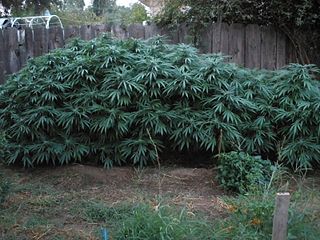Related Research Articles

Tamarind is a leguminous tree bearing edible fruit that is indigenous to tropical Africa. The genus Tamarindus is monotypic, meaning that it contains only this species.

The Rhizobiaceae is a family of proteobacteria comprising multiple subgroups that enhance and hinder plant development. Some bacteria found in the family are used for plant nutrition and collectively make up the rhizobia. Other bacteria such as Agrobacterium tumefaciens and A. rhizogenes severely alter the development of plants in their ability to induce crown galls or hairy roots found on the stem. The family has been of an interest to scientists for centuries in their ability to associate with plants and modify plant development. The Rhizobiaceae are, like all Proteobacteria, Gram-negative. They are aerobic, and the cells are usually rod-shaped. Many species of the Rhizobiaceae are diazotrophs which are able to fix nitrogen and are symbiotic with plant roots.

Cannabis indica is an annual plant in the family Cannabaceae. It is a putative species of the genus Cannabis. Whether it and Cannabis sativa are truly separate species is a matter of debate. The Cannabis indica plant is cultivated for many purposes; for example, the plant fibers can be converted into cloth. Cannabis indica produces large amounts of tetrahydrocannabinol (THC). The higher concentrations of THC provide euphoric and intoxicating effects making it popular for use both as a recreational and medicinal drug.
Beijerinckia is a free living nitrogen-fixing aerobic microbe. It has abundant of nitrogenase enzyme capable of nitrogen reduction.
Beijerinckia derxii is a nitrogen fixing bacteria from the genus of Beijerinckia.
Beijerinckia doebereinerae is a bacterium from the genus of Beijerinckia.
Beijerinckia mobilis is a nitrogen fixing bacteria from the genus of Beijerinckia.
Bradyrhizobium oligotrophicum is a nitrogen-fixing bacteria from the genus of Bradyrhizobium which was isolated from rice paddy soil in Miyagi Prefecture in Japan.
Sphingomonas indica is a Gram-negative, rod-shaped and non-motile bacteria from the genus of Sphingomonas which has been isolated from hexachlorocyclohexane soil from a dump site in Ummari near Lucknow in Uttar Pradesh in India.
Xenorhabdus indica is a bacterium from the genus of Xenorhabdus which has been isolated from the nematodes Steinernema thermophilum and Steinernema yirgalemense. Xenorhabdus indica produces the Taxlllaids A–G.
Bhargavaea is a bacteria genus from the family of Planococcaceae.
Actinorectispora is a genus from the family of Pseudonocardiaceae, with one known species.
Actinorectispora indica is a Gram-positive and aerobic bacterium from the genus of Actinorectispora which has been isolated from soil from Kurnool in India.
Saccharopolyspora indica is a bacterium from the genus of Saccharopolyspora which has been isolated from the rhizosphere of the plant Callistemon citrinus from New Delhi in India.
Microvirga indica is a Gram-negative, non-spore-forming and arsenite-oxidizing bacterium from the genus of Microvirga which has been isolated from metal industry waste soil from Pirangut in India.
Defluviimonas indica is a Gram-negative, strictly aerobic, chemoheterotrophic and motile bacterium from the genus of Defluviimonas which has been isolated from a deep-sea hydrothermal vent from the Southwest Indian Ridge in China.
Ignatzschineria indica is a Gram-negative, aerobic, non-spore-forming and non-motile bacterium from the genus of Ignatzschineria which has been isolated from the gut content of flesh flies from Pune in India.
Idiomarina indica is a Gram-negative, aerobic and rod-shaped bacterium from the genus of Idiomarina which has been isolated from seawater from the Indian Ocean.
Paenisporosarcina indica is a psychrophilic, Gram-positive, aerobic, spore-forming and rod-shaped bacterium from the genus of Paenisporosarcina which has been isolated from soil near the Pindari glacier in the Himalayas.
Sphingopyxis indica is a Gram-negative, aerobic, non-spore-forming, rod-shaped and non-motile bacterium from the genus of Sphingopyxis.
References
- ↑ LPSN lpsn.dsmz.de
- 1 2 UniProt
- ↑ Tamas, I.; Dedysh, S. N.; Liesack, W.; Stott, M. B.; Alam, M.; Murrell, J. C.; Dunfield, P. F. (2010). "Complete Genome Sequence of Beijerinckia indica subsp. Indica". Journal of Bacteriology. 192 (17): 4532. doi:10.1128/JB.00656-10. PMC 2937395 . PMID 20601475.